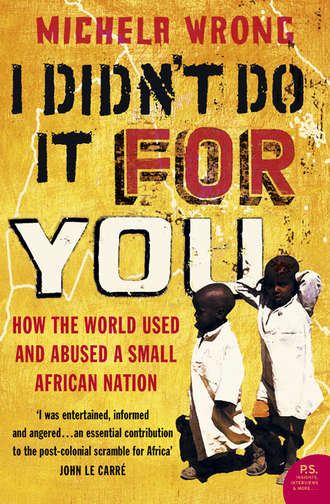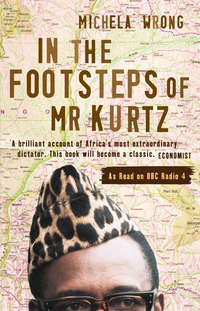
Полная версия
I Didn’t Do It For You: How the World Used and Abused a Small African Nation
Such optimism was compounded by the low regard in which the Italians were held as fighting men. The sight of thousands of Italian prisoners-of-war straggling along in dejected columns had registered on the British troops gathering in Happy Valley. Your average Itie, it was felt, was essentially a fun-loving, happy-go-lucky sort, who packed up fairly easily, showing nothing approaching the steely focus of the German. Italian equipment was lightweight and insubstantial because, in his rush to arm a ballooning military, Mussolini had cut corners and gone for the cheapest options. Often it lay unused at the depot, because the munitions from Rome did not match up with hardware on the battlefield. If the Italians nominally boasted 250,000 men in eastern Africa, Eritrean and Ethiopian ascaris accounted for 75 per cent of these forces, and their loyalty to their masters â who were only paying their wages spasmodically â was shaky. What was more, the Italians, cut off in the Horn, would inevitably face tremendous problems of resupply once they came under pressure. In trying to protect an African empire stretching across 1 million square miles, Italian forces were dangerously over-extended.
What the British troops initially failed to appreciate, however, was that those facing them were no ordinary Italian troops. The regiments and battalions sent to fight in Keren â the Savoia Grenadiers, the Bersaglieri and the Alpini â were the best Italy could muster. The moment they crossed the border with Sudan and stepped onto Eritrean soil, these men were fighting on what they considered home turf, defending Italyâs oldest colony from a foreign invader. In the case of the Alpini, they had grown up in a northern version of the mountainous terrain now confronting them. âWhat are those goats running up there for?â a British colonel asked one of his officers on arrival in Happy Valley, spotting movement on the heights. âThose are not goats, sir,â was the ominous reply. âThey are Alpini.â8
The Italians had the confidence that comes with knowing you enjoy a nearly impregnable position. They held the high ground. The slopes were so rocky that the British could never dig trenches, sheltering instead behind sangars, piles of rocks that provided little protection against a direct hit. What was more, however cheap Italian hardware might be, British equipment â much of which dated back to the First World War â was ill-suited to Keren. The lumbering 25-pound guns were too cumbersome to be taken up the slopes and their long, low trajectories were most effective on flat terrain. Used in mountains, the shells either screamed harmlessly over the heads of Italians crouched on the far sides of the ridges or clipped the tops of the crests on which British troops moved, subjecting soldiers to terrifying âfriendlyâ fire. âTo be shot up the back passage by your own guns when your rickety breast work is designed to give you protection from the front creates a paralysing terror,â remarked Peter Cochrane, who served with the Cameron Highlanders.9 In contrast, the nimble Italians had pack guns that could be moved about on the backs of mules, small red grenades which were simply dropped onto advancing troops and mortars which lobbed their missiles high in the air and neatly onto British positions.
The terrain in itself was challenge enough, but there was also the climate to contend with. On the plains, temperatures rose so high that convoys would sometimes grind to a halt within minutes of departure; radiators boiling, fit young soldiers keeling over with sunstroke. Today, the UN issues its forces in Eritrea with four and a half litres of drinking water a day. The soldiers at Keren were expected to march, run and fight on a pint a day, dysentery or no dysentery. No one wanted to waste a precious drop on washing, so teeth grew black, faces so caked with dirt soldiers often struggled to recognize one another. Rations were monotonous: dried biscuits and bully beef served in metal tins which became too hot to hold and whose instruction labels â âchill before servingâ â were a source of bleak amusement. In other campaigns, British forces supplemented their diet with fruits and vegetables collected on the way. Here, with the exception of the occasional guinea fowl, the landscape had almost nothing to offer. The result was a low-vitamin diet that undermined the bodyâs immune system. Scratch your arm on a thorn tree and within a few days it would go septic. Then the âdesert soreâ would spread until much of the limb was a suppurating mass of pus requiring hospital treatment. The baggy shorts and kilts worn by the troops were a menace, the soldiers soon concluded: in daytime they failed to protect the legs from sun and scratches, at night the men shuddered with cold on the hillsides.
This was not to be a sophisticated campaign. With mechanized transport ruled out by the gradient, fighting often took on an almost medieval directness. When the big guns fell silent, the battle of Keren was reduced to a low-tech war in which the readiness to emerge from cover, stagger up a mountain slope and simply bludgeon a way through mattered far more than weaponry. When Italian positions were overrun, it was a question of hand-to-hand fighting, with few prisoners taken and killing done by bayonet. At one stage, an Indian brigade actually made itself shields of corrugated iron. Held over the head in true storming-the-ramparts tradition, they proved surprisingly effective in warding off the pepperpot grenades raining down from above.
Three days after the first assault on Sanchil and Brigâs Peak had failed, leaving only Cameron Ridge in British hands, Platt ordered an outflanking attempt to be made at Acqua Col, the mountain pass over which the Sphinx held watch. But commanders had only a vague grasp of how the land lay and the Rajputana Rifles were obliged to grope their way forward in the dark. The Italians, enjoying sweeping views, realized what the British were attempting well ahead of time and prepared a devastating response. After four days of fighting, both sides pulled back, exhausted.
Platt was coming under enormous pressure to wrap the Keren campaign up. In London, Winston Churchill was desperate to move British forces back to the Western Desert, to combat the growing menace posed by Rommelâs Afrika Korps. The rains were due to start in a few weeksâ time â another good reason to get Keren over with. But the first two attempts had shown the town could neither be taken by surprise nor from the side. Frontal assault, the great taboo of military strategists, was going to be the only way in. British forces would have to take the mountain range the hard way: feature by individual feature. It was not a task, Platt knew, to be undertaken without a great deal of logistical preparation.
The next month was spent in a frantic whirr of activity as the British stockpiled ammunition, fuel, rations and water. Martiniâs old Italian railway was extended, every available wagon, truck and mule and camel press-ganged into service as the British set up a supply chain that stretched from Port Sudan, via Kassala, all the way to Happy Valley. The troops would not attempt another push, Platt decided, until he had enough supplies to last two divisions for 14 days of sustained assault.
While the stockpiling continued, soldiers up on Cameron Ridge gritted their teeth and hung on to their precious bluff of captured land. They had never experienced conditions like this before. Italian fire was killing or wounding between 25 and 30 men on the ridge every day. Adopting a technique that would later become a way of life for the Eritrean guerrilla movement, the British forces learnt it was wisest to move at night, covering the ground in scampering crawls. Wounded soldiers would lie stifling their groans during daylight, waiting for the darkness that made evacuation possible. It took 12 men to carry one man down the mountain. There was no way of safely burying the dead, so bodies lay where they had fallen or were pushed into nearby ravines, where they blew up in the heat, attracting dark clouds of flies. Rotten odours seem to travel further in dry heat, there was no avoiding the smell. Digging latrines was out of the question, so the stench of human excrement was soon added to the sweet stink of rotting flesh. The men smoked hard to drown out the nauseous odour and when the tobacco ran out, they smoked tea leaves. At night they could hear jackals tearing at the corpses of their former friends, a sound to turn the stomach. In daytime, another local species made its unwelcome appearance. âThereâd be a scrambling around and a rush of stones. Everyone would get in a state of tension and think this was the start of an attack, only to see the coloured behind of a baboon passing on the skyline,â said Kerr.10
Keeping the Cameron Highlanders up on the ridge supplied with water presented Platt with a major operational challenge in itself. A train of mules had been brought in from Cyprus, but even these surefooted animals regularly lost their footing, their bodies bouncing down the slopes. In any case, there were never enough mules for the task, so the troops were enrolled as pack animals, carrying water and bullets to those on the front line.
But the Italians were also suffering. Normally, attacking forces sustain the lionâs share of injuries. At Keren, however, the hard rock surface was responsible for hundreds of deaths by indirect fire, as each landing shell sent shards of shattered stone flying in all directions. âMy troops are exhausted both physically and morally,â General Nicola Carnimeo, who repeatedly demanded reinforcements, warned Frusci. âWe have had very heavy casualties and the length of the perimeter is such that the defence will necessarily be thin on the ground. If the British concentrate a sufficiently strong force, they may well smash a gap in the ring.â11 Italian forces had also been thinned by desertions. The RAF had been dropping leaflets over enemy lines announcing that Emperor Haile Selassie was returning to his rightful throne in Ethiopia and calling upon the ascaris to rise up against their Italian masters. Whether the propaganda had any effect or the British bombardment was simply too ghastly to endure, hundreds of Eritrean and Ethiopian recruits were defecting.
In mid-March, Platt decided he was ready and summoned his officers. âDo not let anybody think this is going to be a walkover,â he told them. âIt is not. It is going to be a bloody battle, a bloody battle against both enemy and ground. It will be won by the side which lasts longest. I know you will last longer than they do. And I promise you I will last longer than my opposite number.â12 As far as Platt was concerned, this represented the last throw of the dice, for he had run out of alternative schemes. âWhat will you do if it doesnât come off?â General Archibald Wavell, Commander-in-Chief of the Middle East, asked him in the days leading up to the attack. âIâm damned if I know, sir,â he replied. March the 15th was designated as the day of the assault, a week earlier than Platt would have liked, but headquarters were pushing. Platt quickly regretted his scheduling: the day dawned oppressively muggy. âI could not have chosen a worse date. Some of the efforts of the troops that day were defeated almost as much by the heat and heat exhaustion as by hostile opposition.â
As 96 British big guns opened fire and the Italians responded with a barrage of machine-gun fire and a hail of mortars, the 4th Indian Division launched a multi-pronged assault on Hogâs Back, Brigâs Peak and Sanchil, while the 5th Indian Division followed up with an attack on Fort Dologorodoc. This was the rationale behind the long weeks of stockpiling. Over the next 12 days, British artillery worked its way through a stockpile of 110,000 shells, representing, Platt later calculated, the equivalent of 1,000 lorry-loads of ammunition. Firing continually, the British were inflicting a highly effective form of psychological torture: sleep deprivation. âWeâd be given a list of pre-arranged targets and we would go through them in chronological order through the night, keeping them on their toes,â recalled Winchester.13 In that rocky terrain the shock waves bounced from cliff to cliff, numbing the brain and shattering the senses. Cochrane experienced the intolerable effect of this constant bombardment from the other side after being taken prisoner by the Italians. âBy the second night,â he recorded in his memoirs, âI would have given anything to get off the hill.â14
The West Yorkshires finally broke through on March 16, seizing first the Pimple, then the Pinnacle and finally Fort Dologorodoc. For the first time, the British could venture close enough to inspect the pile of rocks blocking Dongolaas Gorge. It proved to be nothing like as solid as feared â sappers estimated they could clear it in two days. Suddenly Keren no longer seemed quite so impregnable. âKeren is ours!â declared one British commander.
He was a trifle premature. Realizing that Dologorodoc represented a fatal breach, Carnimeo tried repeatedly to recapture the fort, sending wave upon wave of Savoia Grenadiers and native troops unsuccessfully against the position. As bodies piled up at the fort perimeter, Italian morale began to waver. It nearly buckled entirely when the popular Lorenzini, said by the ascaris to be immortal, was killed reconnoitring the ground for a seventh counterattack. Italian units were now down to two-thirds of their original strength. But British nerves were also starting to go. On the crests, young men who knew they were about to die penned farewell letters to their parents. Casualties were running so high that drivers, orderlies and mess sergeants were being mustered to form new companies thrown into the fray. âThere was a nasty moment when one or two people got so-called shell shock and we had to take a very firm line,â remembered Kerr. âIt started spreading, demoralization is very infectious. There are moments when you simply have to say âGo back where you came from and donât come running down here.â At heart we all wanted to turn away. It was only pride or shame or a sense of responsibility that kept you going.â15
In the early hours of March 25, the British played their final card. Two brigades attacked on either side of Dongolaas Gorge, one unit working its way silently along what proved to be a poorly-barricaded railway tunnel high on the ridge, the other moving up from Fort Dologorodoc. By the morning of March 27, a last desperate Italian counterattack had been repulsed and sappers had cleared the pass. The guns fell silent as white flags shot up from Italian soldiers on the peaks. With his units in tatters, Frusci had ordered a withdrawal, congratulating his soldiers for their heroism in a florid declaration. âOur many dead, who include one general and five senior officers, remain in Keren as armed guards and a warning to the enemy. We have left Keren only temporarily,â he promised, unconvincingly. âWe will soon return there and the sacred flag of our country will once again flutter in the light of our future glory.â16
If Platt had fulfilled his pledge to last longer than his opposite number, it had only been by a hairâs breadth. The British had come within a whisper of calling off the assault. The general later confessed that in the last three days of the battle, his reserves had shrunk to just three tanks. âA company commander said to me when he heard that, âWas that quite sound sir?â No, it was contrary to every book that had ever been written, but it came off.â17
The battle of Keren was over and with it, Italyâs most spirited military performance of the Second World War. The official Italian tally was 3,120 dead â a total that characteristically omitted around 9,000 Eritrean and Ethiopian ascaris who had fallen alongside their European comrades.18 British forces, which had pulled off what was as much a quartermasterâs as a soldierâs victory, had lost between 4,000 and 5,000 men.19 Added together, both sides had probably sustained more than 50,000 casualties, averaging out at around 1,000 dead and wounded each day. âIt was incredibly tough, and it is a source of wonder how we ever succeeded,â an officer in the West Yorkshire Regiment later recalled. âIt will never, like some battlefields of the First World War, look small and insignificant, but will stand always, huge and rugged, the gateway to Eritrea.â20
The feared escarpment had gone from insurmountable threat to just another geological feature. The Pimple, the Pinnacle and the Sphinx were no longer of any interest to the British soldiers who had crouched in the dust, trying to guess what hidden gullies and unexpected ridges â the dips and bumps that held the key to survival or destruction â lay ahead. As instructions were shouted, equipment packed and trucks and tanks jostled, nose to tail, for their place in the grey-green caterpillar working its way up Dongolaas Gorge, past the inevitable anti-climax that was Keren itself, the men were already forgetting a landscape they would never see again. For many, there was a dreamlike quality to the sudden telescopic shift in focus. âIt always surprised me, in any battle, how limited oneâs life was while the battle was going on,â remarked Kerr. âYou knew every stone for the next 50 yards. It always struck me as extraordinary how when a battle ended, like in Keren, how the next day the birds were there, peace reigned, the place was in a bit of a mess, suddenly there were trees and everyone walking about and standing up in daylight and one wondered at how different it was from yesterday, a different world entirely â what had we been doing all those weeks? At one moment somewhere is a battlefield and life is being lost right and left. And the next day, total peace and silence.â21 The convoy roared through Keren â âa pathetic little townâ, commented Richard Dimbleby, before putting it out of his mind forever â and ground on to Asmara.
Frusci was to stage a series of rearguard actions further up the Imperial Way, but his men had lost their stomach for the fight. The trouble with Maginot lines, as military strategists know, is the symbolic significance they come to acquire in the eyes of those who shelter behind them. When they collapse, so does the notion of further resistance. The Italians knew that they were not going to stumble on a better position than Keren, and Keren had gone. A few days later, Dimbleby, who had given his radio listeners a crisply eloquent account of the campaign, watched open-mouthed as a small touring car loaded with Italian officers and dignitaries, waving a large white flag, drove past him. They had come to negotiate a surrender. On April 1, Asmara was declared an open city, saving its elegant boulevards from the ravages of British artillery. Massawa fell a week later. After half a century of occupation, the Italians had lost their first-born colony, and with that defeat the surrender of Ethiopia to the south became a matter of time.
Mussoliniâs new Roman Empire was imploding, and Eritreaâs surrender freed up the troops Wavell desperately needed. They were allowed only the briefest of breathing spaces before being whipped away to fight Rommel. Had Keren not fallen when it did, British morale, bruised by Dunkirk and the Blitz, might never have recovered. Its conquest was a small but crucial part in turning the tide of the Second World War, from a position where a vast Nazi empire seemed a certainty to a point where Allied victory was for the first time conceivable.
Strikingly absent from this whole strategic picture â staggeringly absent, indeed, from all the vivid veteransâ memories and detailed military reports on Keren â is any mention of the people most immediately concerned by the events of 1941: the Eritreans themselves. The British soldiers who fought in Keren struggle to recall a single encounter with a local, an unsurprising lacuna, perhaps, given that until Asmara, Eritrean towns had either been bombed or marched through by the Allies, but never occupied or administered. Asked about the Eritrean countryside, one officer mused, âThere was no countryside, really,â as if he had been marching across a blank vista. What the invaders retained was the impression of a landscape bereft of people, stripped of vegetation, a moonscape so desolate it seemed the ideal setting for a war. As for the Italians, the words they ordered to be carved on the white gravestones erected over the tombs of every Eritrean and Ethiopian who fell at Keren say it all. âAscaro Ignotoâ â âUnknown Ascaroâ. The Italians didnât even know the names of the natives who died for them.
The post-independence Kenyan politician Tom Mboya used to recount how a white customer once poked her head into the office where he was sitting working, looked around, and said: âAh, nobody here,â as an example of how colonial assumptions about authority rendered blacks effectively invisible. There are echoes of the Tom Mboya experience for the Eritreans at this juncture in their history: to the outside world they seemed as insubstantial and transparent as the chill mountain air. Despite all the promises made in the leaflets sprinkled by the RAF, Britain had not invaded Eritrea to free the natives from colonial rule. It had fought the battle of Keren for strategic reasons that stretched far beyond Eritreaâs borders and bore no connection to local wishes, a matter of supreme indifference, at this stage, to London.
It is a view of the world reflected in the story that has passed into Eritrean history concerning Keren. In a way, it doesnât really matter whether the tale is apocryphal or not, because it says so much about the gathering cynicism of a people who had come to understand their country was no more than a proxy location for a war, this merely a dress rehearsal of the great fight between Fascism and Liberal Democracy that would be concluded elsewhere.
Конец ознакомительного фрагмента.
Текст предоставлен ООО «ЛитРес».
Прочитайте эту книгу целиком, купив полную легальную версию на ЛитРес.
Безопасно оплатить книгу можно банковской картой Visa, MasterCard, Maestro, со счета мобильного телефона, с платежного терминала, в салоне МТС или Связной, через PayPal, WebMoney, Яндекс.Деньги, QIWI Кошелек, бонусными картами или другим удобным Вам способом.




